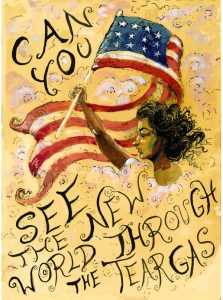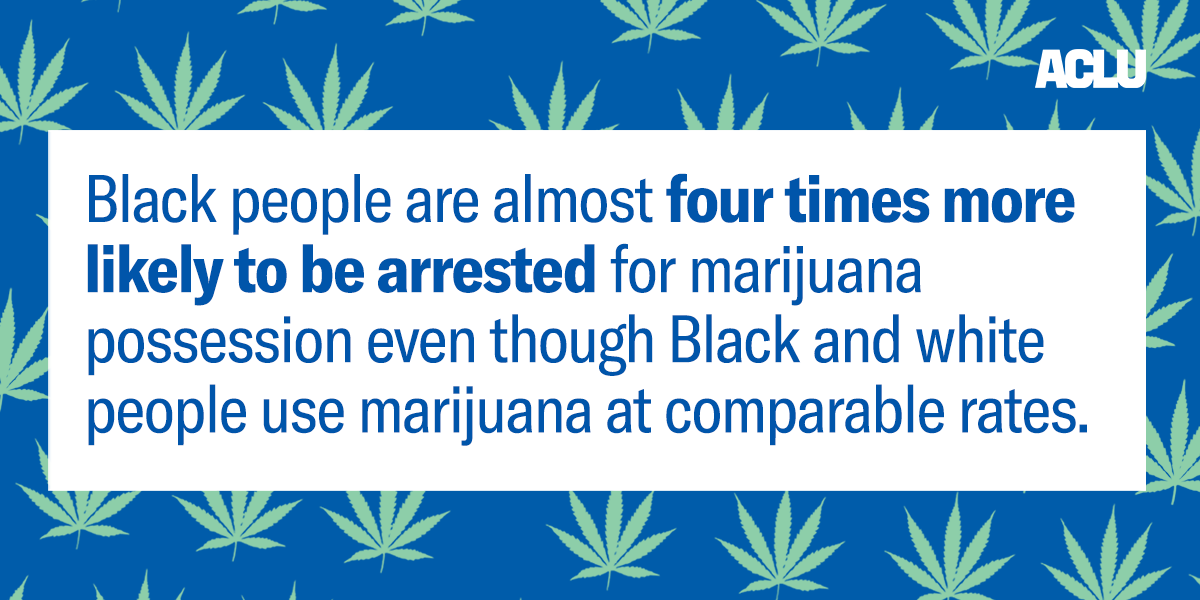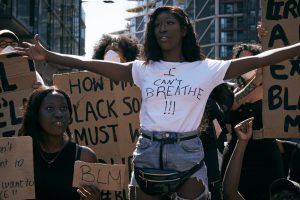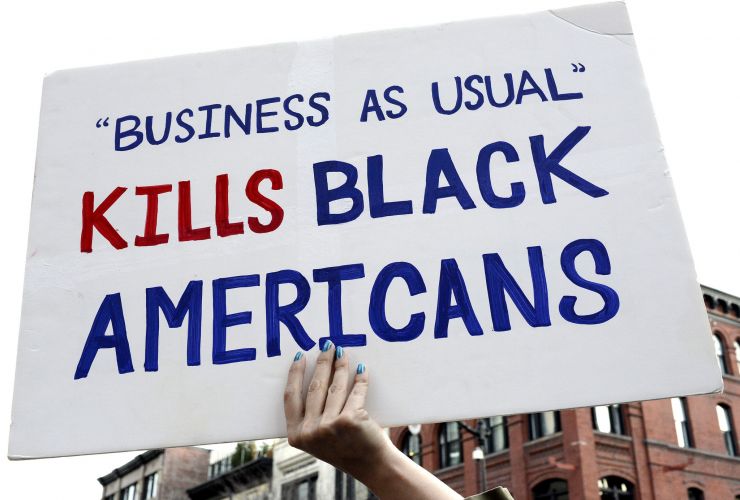An Imperfect Ally
I came of age during the Occupy Wall Street movement. At first, many media outlets labeled the protests silly. The Daily Show, for example, spent a whole segment discussing the bathroom logistics of Zuccotti Park. But the New York government must have felt threatened because Mayor Bloomberg deployed hoards of police to “clean up” the area. Police brutality was ongoing as law enforcement utilized batons, mace, fists, rubber bullets and boots to silence the movement. While black protestors were hit especially hard, it was a bloodied, white face that garnered national attention.
As an ignorant 16-year-old living in a suburbia some thirty minutes away, I’d never thought about white privilege. At the time, I didn’t know that black skin could be a death sentence. I didn’t know about the prison-industrial complex, that my town was the result of white flight or even that much of my high school faculty was overtly racist. During Occupy Wall Street, I watched my country disregard black pain and I stayed silent.
I am not a perfect ally. In the words of Angelica Alzona, “I-in my whiteness, my relative economic comfort, my blind spots and areas of ignorance – have surely offended and impeded someone else.” Still, it is my responsibility and the responsibility of all allies to continuously strive to do better. It is not enough to march, donate and post. All white folk are beneficiaries of racism. As such, fighting racism necessitates that white people partake in persistent self-reflection and active listening. Allyship is a lifelong process.
Beyond the Protests
In New York City this past week, a cop drove his car into a crowd of protestors. Tear gas spread through the streets, rubber bullets flew and police beatings were caught on camera. Those arrested are being denied masks, food and water. In other words, the NYPD is continuing its reign of terror. Shown by the stories of George Floyd, Breonna Taylor, Tamir Rice, Michael Brown, Tony McDade, Atatiana Jefferson and so many others; police violence is not tied to protest or unrest. Rather, it is an unyielding and seemingly timeless epidemic. Moreover, the racism in our penile legal system doesn’t stop at arrest.
A Boy Named Ron
Black men and people of color are not only more likely to be convicted of crimes than their white counterparts, but also are more likely to be strapped with longer and more extreme sentences. For example, controlling for crime, black people are disproportionately charged with felonies. In my college, there was a white boy who grew weed. We’ll call him Ron. Ron was caught and suspended, able to return to university a year later. Ron served no jail time and his record was wiped clean after he completed probation. Had Ron been labeled a felon, as many marijuana growers are, he would’ve lost the right to vote and would have faced employment discrimination. He may also have missed out on years of education due to imprisonment.
Ron was given the benefit of the doubt. People said he was a good kid, just a little lost. The consensus was that this 19-year-old’s life would amount to something and that derailing Ron’s path would therefore be cruel. Most black children, teens and adults are not given the same respect. They are imprisoned and killed for much less. Explicit and implicit biases cause people to view black folk as threatening. Today, roughly 6 million Americans can’t vote due to felony status. This includes some 33% of the African-American male population.
A Brief and Incomplete Plea for Police Abolition
Our legal system is unjust. Abolishing the police is the first of many necessary corrective steps. In the past 40 years, the price of policing has tripled, reallocating funds from other necessary public works and community building activities. For example, the police department budget in LA comprises more than 50% of the city’s general fund. In the budget for 2020 alone, the LAPD is slated to receive 260% more than housing has in the last decade. Moreover, the mayor has actually decreased the budget for Housing and Community Investment despite the “homeless crisis” and the fact that a whopping 55% of LA residents are unemployed. While those who work in Housing and Community Investment are on furlough due to covid19’s impact on city revenue, LAPD officers with college degrees will receive an additional $41 million in bonuses.
It is important to note that many police officers do not live in the communities they serve. The goal of police abolition is not anarchy. Rather, it is to divert police funding to multiple community-based “safety, support and prevention” initiatives. Standard police training is just 21 weeks, yet police are demanded to deal with everything from domestic abuse to counter terrorism to hospital runs. This is both dangerous and unsustainable. More targeted and specifically trained agencies are necessary. Moreover, crime rates are lowest in high resource communities. Thus, initiatives that increase access to opportunity, education, housing and food are likely to decrease crime.
The Tired Generation
Right now, we are advocating for swift and dramatic changes to our legal system. However, racism extends beyond these issues. The fight will continue into tomorrow and the day after and so forth for decades if not centuries. In my life, I’ve seen movements rise and fall. When the 2011 protests (Occupy, Greece, the Arab Spring, etc.) ended in, at best, business as usual, hopelessness took control of many. I am part of a bitter generation that has lived through the War on Terror, the War on Drugs, the opioid epidemic, two global recessions, climate change and a pandemic. For us, the end of the world is easier to imagine than the fall of unfettered capitalism.
I’m not sure that I believe Martin Luther King Jr.’s words: “the arc of the moral universe is long, but it bends towards justice.” However, I know there is no moral choice, but to try to make this world better. So roll up your sleeves. We’ve got work to do.
Sources:
https://jezebel.com/becoming-ugly-1789622154
https://news.uga.edu/total-us-population-with-felony-convictions/
https://www.theguardian.com/us-news/2020/jun/05/defunding-the-police-us-what-does-it-mean
https://www.latimes.com/california/story/2020-06-04/lapd-budget-cuts-garcetti-protests-explainer
https://www.latimes.com/california/story/2020-04-17/usc-coronavirus-survey
https://la.curbed.com/2020/6/2/21277088/defund-police-los-angeles-lapd-budget
https://www.nytimes.com/2016/08/19/us/when-police-dont-live-in-the-city-they-serve.html
Posted By Alex Mayer
Posted Jun 18th, 2020







3 Comments
Iain Guest
June 25, 2020
Alex – I was very moved to read this blog. You’re telling us that racism is in our heads, as well as our policies and practices. It’s so hard to put yourself in the skin of another person and imagine what he or she is going through, but you show how important this is and also how difficult. I have not come nearly as far in my own journey, in spite of being on this earth for longer than you, and in spite of many years of working abroad. But maybe that is why. When you work abroad, with people who welcome you for what you are, your guard tends to drop and you become very comfortable with diversity. The idea that someone with a black skin is several times more likely to be arrested on our own streets, is entirely strange. Occasionally you realize it with a start, and then it’s back to normal life. You remind us that we should never stop making the effort to understand. I need to reflect on this…..
Brigid Smith
July 1, 2020
I agree with Iain’s comment. Alex, your blog put into words how each of needs to be reflecting on racism. Not only that, but my familiarity to diversity has also made me ignorant of the true effects that race has on people’s lives/opportunities, especially within the U.S. Thank you for taking the time to write down a reflection that prompts true action and a realization that issues of racism will only be solved if we reject what we consider to be “normal” for a better future.
Ezoza Ismailova
July 6, 2020
Alex, as I attempt to also better my allyship to this movement, I have been trying to understand terminology that I have never heard of before. With that in mind, I found the section under ” A Brief and Incomplete Plea for Police Abolition ” especially informative. I have seen phrases such as “Abolish the Police” and “Defund the Police” everywhere but was struggling to find an explanation of how either one would work. However, your blog post cleared that up for me. In addition, I was also not aware of the fact that “crime rates are lowest in high resource communities” but knowing that, the rest of the idea behind those phrases make a lot more sense.